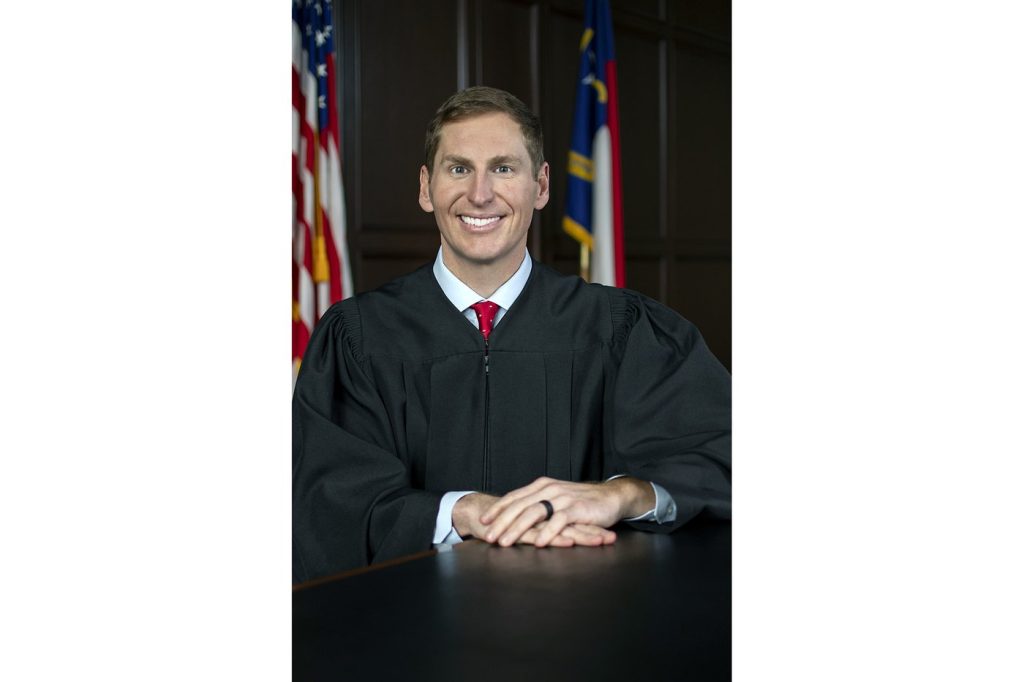RALEIGH, N.C. (AP) — The North Carolina Supreme Court has dismissed a request from Republican Jefferson Griffin, the trailing candidate in a closely contested race for a seat on the court, aiming to remove over 60,000 ballots from the tally. The justices issued an order on Wednesday, directing that Griffin's challenges to the State Board of Elections be handled first in the local trial court, as mandated by state law.
Griffin's legal motion sought to expedite the process by appealing directly to the Supreme Court instead of starting with Wake County Superior Court. The court's decision to dismiss this petition could prolong the resolution of the election results, where Justice Allison Riggs, a Democrat, currently leads Griffin by 734 votes out of more than 5.5 million ballots cast. This race follows a lengthy recount and the election board’s rejection of Griffin’s protests.
The dismissal of Griffin's petition, described as a "writ of prohibition," was unanimous among the six justices deliberating the case, although Justice Riggs recused herself. The court characterized the issuance of such a writ as "extraordinary" and emphasized that it should not bypass standard legal procedures. With Election Day occurring 2 1/2 months ago, the justices urged the Wake County court to "proceed expeditiously" in reviewing Griffin's appeals, indicating that the matter could eventually return to the Supreme Court.
The timing of the court's decision was somewhat unexpected, as it was made while the justices were still gathering legal briefs about whether to accept Griffin's request. A temporary stay previously issued by the Republican-majority Supreme Court on January 7 is still in effect, which prevents the State Board of Elections from formally certifying Riggs as the election winner.
The Supreme Court's decision, however, does not impact the scheduled oral arguments set for Monday at the 4th U.S. Circuit Court of Appeals. During these proceedings, attorneys for Riggs, Griffin, the state board, and other parties will discuss whether the questions regarding the 66,000 challenged ballots should be heard in federal court. The legal representatives for Riggs and the board argue that the situation pertains to federal voting rights and election law, while Griffin's team contends the case belongs in state court.
Griffin's legal team maintains that the absentee and early votes in question were cast in violation of state registration, residency, and photo identification laws. They assert that the State Board of Elections failed to enforce these regulations adequately, claiming that even a small number of removals could potentially alter the election outcome. Conversely, Riggs asserts that these votes were lawful and criticizes Griffin for attempting to overturn the election results retroactively, infringing upon the rights of legitimate voters.
In the written opinions accompanying the court's order, Chief Justice Paul Newby, one of five registered Republicans on the court, upheld Griffin's right to file protests as allowed by state law. He noted the historical precedent of contested elections in North Carolina taking a considerable amount of time to resolve and countered accusations that Griffin was trying to "disenfranchise" voters or intentionally delay the certification process.
Griffin had initially led the race by 10,000 votes on election night; however, as provisional and absentee ballots were counted, Riggs eventually surpassed him for the lead. Justice Newby acknowledged the confusion surrounding the sudden change in election outcomes, emphasizing that Griffin has a legal right to pursue a formal inquiry into the election results.
In contrast, Associate Justice Anita Earls, the only Democrat participating in the case, argued for the dismissal of the temporary stay preventing the certification of Riggs's victory. She expressed concern over Griffin's attempt to invalidate the votes of over 60,000 voters without identifying any fraudulent ballots. Earls noted that while she recognizes the contentious nature of the situation, she remains confident in the judiciary's ability to assess the claims fairly.










